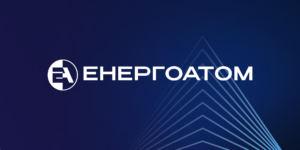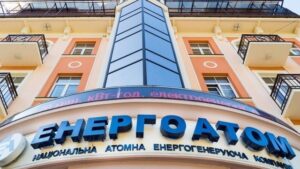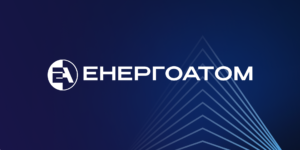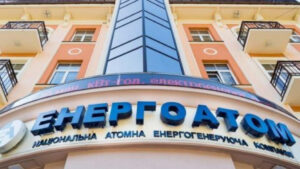
NAEK Energoatom plans to complete the construction of all planned second-level protective structures (concrete structures against drone strikes and missile debris) for important elements of Ukraine’s operating nuclear power plants in 2026, according to the company’s CEO Pavlo Kovtonyuk.
“The first is passive protection of critical elements of nuclear power plants. It consists of several levels, and the first level (gabions and big bags – ER) is already complete. The second level is nearing completion. This work is being carried out according to the approved schedules and plans,” Kovtonyuk said in a conversation with journalists during a trip to one of the nuclear power plants, specifying that the construction of level 2 structures at all nuclear power plants is planned to be completed within the current year.
He noted that the second aspect is active protection provided by the Armed Forces of Ukraine, and Energoatom is allocating funds to purchase the necessary systems for such protection of the sky near nuclear power plants. Kovtonyuk did not specify the amount of funding for protection work and the funds allocated to the military, noting that “plans and projects agreed with the General Staff are financed without restrictions.”
Regarding the third level of protection (including underground structures designed to withstand direct missile strikes), the head of Energoatom noted that such projects can be considered individually.
“The third level involves very large-scale work, which can be considered as local projects. There is an example at one of the nuclear power plants where certain elements are protected by the third level. As for scaling, we will consider this possibility,” Kovtonyuk commented.

Ukraine is ready to privatize large state-owned companies, in particular to sell 25% of the shares of NAEK Energoatom, but this requires the involvement of financial institutions and the readiness of European partners, said Alexei Sobolev, Minister of Economy, Environment, and Agriculture.
“We must be ready for privatization, but this also requires a serious approach, on the other hand, and certain assistance from financial institutions to finance these transactions. For example, in the case of Energoatom, we are ready to sell a quarter of the company,” he said at the World Economic Forum in Davos.
At the same time, Sobolev noted that large European companies involved in nuclear energy are currently experiencing their own difficulties, which makes it difficult to acquire a stake in Ukrainian assets during or after the war. According to him, the implementation of such projects requires a joint agreement that the European Union will agree to.
The head of the ministry also stressed the need for large-scale domestic financing. To this end, he said, the government plans to focus on fighting corruption, increasing the legal sector of the economy, and collecting more taxes.
“We are expanding the legal economy and collecting more taxes. But now, if you look, Ukraine distributes about 50% of its GDP. So we are earning money and doing our job,” Sobolev added.

NAEK Energoatom and IC Persha on behalf of the Nuclear Insurance Pool of Ukraine (NIPU) on January 13, 2026 concluded a contract of compulsory insurance of civil liability for nuclear damage that may be caused as a result of a nuclear incident.
According to the Prozoro e-sales system, the value of the contract is UAH 167.913 million, with a validity period from January 29, 2026 to January 28, 2027.
A similar contract was concluded on January 17, 2025.
PJSC Insurance Company Persha has been operating in the insurance market of Ukraine since 2001. The main specialization is automobile insurance. It is a member of the ITSBU, the League of Insurance Organizations of Ukraine, the National Insurer of International Road Transport Books (TIR).
JSPU was established in September 2003 to insure nuclear risks on terms of joint and several liability. Its members are 14 insurance companies of Ukraine.

On December 26, JSC NAEK Energoatom announced a tender for insurance of leased movable property.
According to the Prozorro electronic procurement system, the total expected cost of services is UAH 81,232 thousand. Applications for participation in the tender will be accepted until January 3.

JSC “NAEK ”Energoatom” fully fulfilled its special obligations to ensure the availability of electricity for domestic consumers (PSO), aimed at reducing its cost for the population, covering 100% of the cost of the service from January to November 2025 in the amount of UAH 148 billion (including VAT).
“Energoatom allocated UAH 16.154 billion for the PSO service in November, continuing to bear the key financial burden in the social tariff support system,” the company said on Wednesday.
In the context of military challenges, PSO remains one of the tools for supporting the population.
In total, the projected cost of PSO services for JSC NAEK Energoatom in 2025 is UAH 166 billion (including VAT).
“We would like to remind you that Energoatom covers about 85% of the financial burden necessary to fulfill special obligations to protect the public interest,” NAEK noted.
In 2024, the company paid UAH 153.184 billion (including VAT) for the PSO service.
As reported, in 2024, Energoatom allocated 58% of its net income to pay for PSO. The company’s net profit for the past year amounted to UAH 1.3 billion.
In turn, NAEK’s pre-tax profit for January-September this year amounted to UAH 15 billion 716.90 million, and its net profit was UAH 12.83929 billion, while in the same period last year, the company had a loss of UAH 5.50344 billion and UAH 4.59346 billion, respectively.
As noted in the company’s report, which is available to the Interfax-Ukraine agency, Energoatom’s revenue for the first nine months of this year increased by 33.4% to UAH 173.87386 billion.
Energoatom currently operates nine power units at the South Ukraine, Rivne, and Khmelnytskyi nuclear power plants with a total capacity of 7,880 MW, which are located in territory controlled by Ukraine.
The Zaporizhzhia NPP, with six VVER-1000 power units with a total capacity of 6,000 MW, has not been producing electricity since September 11, 2022, after its occupation on March 3-4, 2022.

JSC NAEK Energoatom analyzed previously announced open tenders, as a result of which the company initiated the cancellation of five tenders for purchases totaling approximately UAH 650 million.
“In order to update the expected purchase price, taking into account the reduced payment terms, the cancellation of five tenders with a total value of approximately UAH 650 million has been initiated,” NAEK reported on Thursday.
Energoatom noted that the company continues to take measures to optimize and improve business processes in the field of procurement.
“In order to prevent a selective or subjective approach to determining the order of payments under concluded contracts, a corresponding system algorithm is being developed,” NAEK said.
The company has also set up a commission to analyze and prioritize production payments.
As previously reported by Energoatom, in order to strengthen cooperation with contractors and taking into account the economic situation in Ukraine, NAEK has significantly reduced the payment deadlines in draft contracts for the supply of goods, performance of work, and provision of services during the period of martial law.
“The updated approach to the formation of contractual terms for setting payment deadlines is related to a review of the financial burden on the company,” the company explained.
Energoatom asserts that for the stable operation of the company in conditions of increased challenges, it is also important to take into account the criticality, importance, and urgency of procurement and strict adherence to the principles of public procurement defined by Ukrainian legislation.